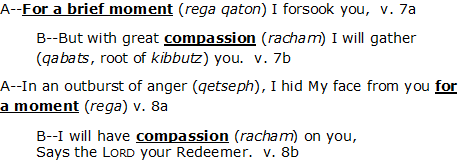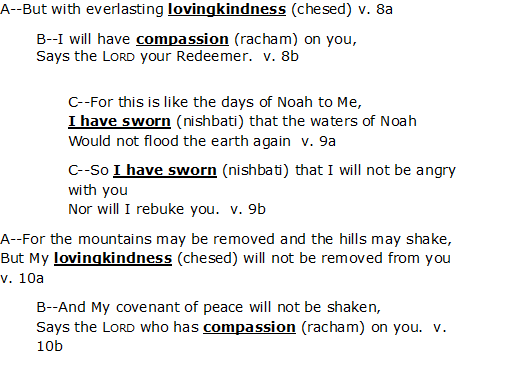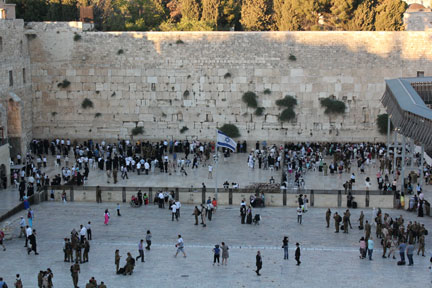CHIASM, ISAIAH 54:7-8

CHIASM, ISAIAH 54:8-10

Explaining the Chiasms
In Jewish liturgy, September 2nd marked the synagogue reading known as Parshah Ki Teitzei (meaning “when you go forth” from the first words of Deuteronomy 21:10). It includes a reading at the end from Isaiah 54:1-10. In three weeks, Jews around the world will celebrate Rosh Hashanah, known Biblically as Yom Teruah, “Day of Shouting” (Numbers 29:1) or Zichron Teruah, “Remembrance shouting,” (Lev. 23:24). The period leading up to that “appointed time” is traditionally one of reflection and self-examination. Isaiah 54:1-10 is a proclamation by God of favor upon Israel. Although there are many dire warnings issued through the prophet upon Israel and Judah, the LORD repeatedly makes clear that His covenant relationship with His people is unchangeable. In the days leading to Yom Teruah, this provides a foundation of encouragement to those immersed in self-examination.
After proclaiming Himself the Holy One of Israel (Qadosh Yisrael) in verse five, the God of all the earth (Elohe ha-aretz), Who is their Redeemer (Ga-a-lek), we reach our first literary structure in verse seven. Here, the prophet contrasts the intense displeasure of the LORD with the national sin of Israel and Judah vis-a-vis the eternally unbreakable covenant between God and His people. We notice repeating words. In lines 7a and 8a, the word “moment” (rega) repeats. “For a small moment (rega qaton) have I forsaken you,” and “I hid My face from you for a moment (rega).” What is a moment? It depends on one’s point of view. For a person immobilized in an MRI machine who experiences an itch, the wait to scratch it can seem indeterminably long, even permanent. To God, however, His absence or hiding is small when compared to His everlasting covenant loyalty (chesed olam) in line 8b. Line 8b also repeats a word, compassion. The momentary forsakenness in line 7a is compared to the great compassion in 7b (racham gadol), reinforced and locked in place by the permanence of God’s everlasting covenant in 8b–a synthetic parallelism. Racham derives from rechem, meaning womb. God, the Maker of Israel (v. 5)–its Mother– will permanently return those He has momentarily forsaken into His protective and peaceful womb. This is the imagery painted by the prophet through his literary arrangement.
Another literary structure overlaps the first, going from line 8a and ending in 10b. Again, we see repeating words. First, lovingkindness (chesed) repeats in 8a and 10a. Chesed refers to the unbreakable covenant between God and His people. We find “everlasting covenant” in 8a, corresponding to the declaration, “My lovingkindness (chesed) will not be removed from you” in 10a–a synonymous parallelism. 8b, in turn, corresponds to 10b, through the repetition of the word compassion (racham). These parallelisms point to a parallelism inside them. The phrase, “I have sworn (nishbati),” repeats in lines 9a and 9b. He swears in 9b that He “will not be angry” with Israel. This corresponds to God’s remembrance of His oath to Noah “when I swore that the waters of Noah would not flood the earth again.” (v. 9a) God’s promise, His oath, in both parts of verse 9 is clear. What, however, do the waters of Noah have to do with being angry?
The Hebrew word for anger used by Isaiah in line 9b is qatsaph. The prophet uses this word eight times, all but once in reference to God. In verse 8, there is a very closely related word used by the prophet, qetseph–“in an outburst of anger.” Both qatsaph and qetseph have an identical structure of consonants–kuf, tsade, feh–and the root meaning of the word formed by those consanants is foam. What happens when water is made hot and agitated? It can start to froth or foam as in a mineral spring, geyser or ocean waves. Therefore, this is what the LORD’s anger and the waters of Noah have in common. And it is the imagery used by the prophet in this passage to paint a “word picture” for those hearing his words.
The literary arrangements of Isaiah are breathtaking, and the words of the LORD spoken through His prophet are equally so. Although the LORD may become temporarily angry, even to the point of exacting judgment, He is inevitably bound to His people by an everlasting covenant, an unbreakable bond to those He brought into being, ultimately bringing them back into His womb by His great compassion.

